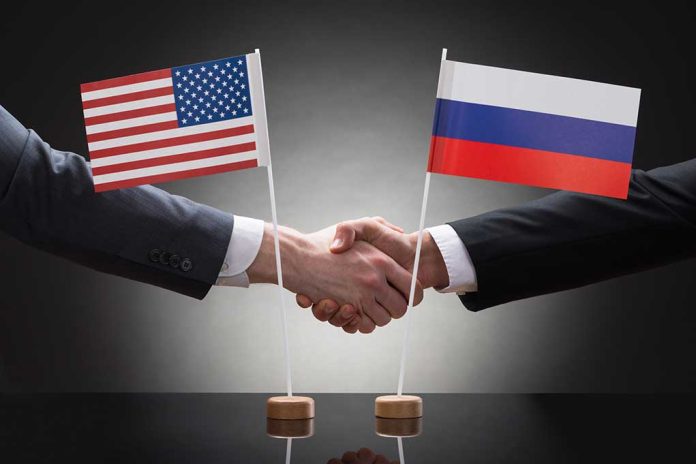
President Trump and Russian President Putin agree to a 30-day halt on Ukraine’s energy infrastructure attacks while planning wider peace negotiations in the Middle East.
Key Takeaways
- Putin agreed to a 30-day pause on Ukraine energy infrastructure attacks following discussions with President Trump, but rejected a broader ceasefire proposal.
- Peace talks will begin immediately in the Middle East, focusing first on energy infrastructure and maritime ceasefire in the Black Sea.
- Ukrainian President Zelenskyy expressed openness to the US proposal while warning about Moscow’s potential delaying tactics.
- Both Trump and Putin discussed the Gaza conflict and expressed mutual interest in improving US-Russia bilateral relations.
- European leaders, including German Chancellor Scholz, have called for a complete ceasefire beyond the limited agreement.
Limited Ceasefire Agreement Reached
Russian President Vladimir Putin has agreed to a 30-day halt on attacks targeting Ukraine’s energy infrastructure following a phone conversation with US President Donald Trump. This partial agreement marks a potential first step toward de-escalation in the long-running conflict. However, Putin declined to accept a broader US-backed ceasefire proposal, citing concerns that Ukraine might use any extended pause to mobilize forces and rearm with Western assistance. The Kremlin has maintained that stopping foreign military aid and intelligence to Kyiv remains a crucial prerequisite for any meaningful resolution to the conflict.
The White House confirmed that technical negotiations for a maritime truce in the Black Sea and discussions about a potential broader ceasefire will commence immediately in the Middle East. Russian attacks on Ukraine’s critical infrastructure have resulted in widespread power outages across the country, while Ukrainian forces have conducted strikes affecting Russian refining capabilities. This limited agreement aims to provide temporary relief to civilian populations suffering from energy shortages as winter approaches.
🚨 Readout of President Donald J. Trump's Call with President Vladimir Putin:
"This conflict should never have started and should have been ended long ago with sincere and good faith peace efforts. The leaders agreed that the movement to peace will begin with an energy and… pic.twitter.com/H7w7FjWDc3
— Trump War Room (@TrumpWarRoom) March 18, 2025
Ukraine’s Cautious Response
Ukrainian President Volodymyr Zelenskyy has expressed cautious openness to the US-brokered proposal while warning about Moscow’s potential intentions to delay meaningful negotiations. Zelenskyy has urged Western allies to maintain pressure on Russia to reach a comprehensive peace deal and rejected any suggestions of suspending military aid to Ukraine. Kyiv remains skeptical about the limited scope of the current agreement, viewing it as potentially insufficient to address the broader conflict or secure territorial integrity.
Diplomatic sources from Al Jazeera reported significant skepticism from Ukrainian officials, who fear that Moscow may use the partial ceasefire to regroup while maintaining other forms of military pressure. European leaders have also weighed in, with outgoing German Chancellor Olaf Scholz calling for a complete ceasefire rather than the limited energy infrastructure agreement. The international community continues to monitor developments closely, recognizing the fragility of this initial diplomatic breakthrough.
Middle East Peace Talks and Bilateral Relations
Following their phone conversation, Trump and Putin agreed to conduct extended peace talks on neutral ground in the Middle East, signaling a potential thaw in US-Russia relations. Both leaders reportedly acknowledged the necessity of ending the Ukraine conflict with a lasting peace agreement rather than temporary measures. The choice of the Middle East as a neutral meeting ground adds another dimension to the negotiations, potentially opening channels for addressing other regional conflicts.
The leaders also discussed the ongoing situation in Gaza, with both expressing concerns about the humanitarian situation while maintaining a generally pro-Israel stance. This marks a rare point of agreement between Washington and Moscow on Middle Eastern affairs. According to sources familiar with the call, there was mutual interest expressed in improving broader bilateral relations between the United States and Russia, which have deteriorated significantly in recent years.
With the situation still developing, the international community awaits further details about the timing and specific agenda for the Middle East peace talks. Military analysts remain cautious about the prospects for a lasting resolution, noting that previous ceasefire attempts have failed to produce sustainable peace. Nevertheless, this diplomatic initiative represents the most substantial effort in recent months to de-escalate a conflict that has caused significant humanitarian suffering and geopolitical instability.
Sources:
Putin Agrees to Pause Attacks on Ukraine Energy Infrastructure in Call With Trump
Russia’s Putin agrees to 30-day halt in attacks on Ukraine energy targets
Trump and Putin to meet in the Middle East for Ukraine peace talks



